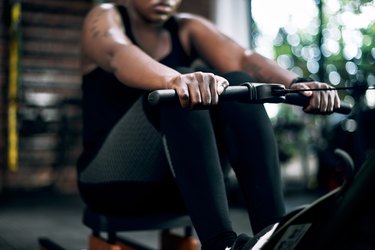
Feeling unmotivated to work out? You might be exhausted, but there's also a chance that a deficiency in the different forms of vitamin B makes exercise especially difficult for you.
Tip
When you exercise with a vitamin B deficiency, you might feel fatigued or weak. In especially bad scenarios, you could injure yourself or not recover properly.
Video of the Day
The relationship between vitamin B9 (folate) or vitamin B12 deficiency and exercise is an especially important one to consider if you're someone who is prone to being deficient, such as vegans or people with digestive problems. Here's what you should know about deficiencies in B vitamins, how those deficiencies might negatively affect your workout, and how you can go about fixing your diet to get you back to your peak performance.
Video of the Day
What Is Vitamin-Deficiency Anemia?
The most commonly deficient B vitamins are vitamin B9 and vitamin B12, according to Piedmont Healthcare, which explains that B vitamins are necessary for converting food into energy. The Mayo Clinic adds that deficiency in these B vitamins is what's known as vitamin-deficiency anemia — it's similar to iron-deficiency anemia in that it causes a lower red blood cell count.
Johns Hopkins Medicine notes that another word for vitamin-deficiency anemia is megaloblastic anemia, meaning the red blood cells are ovular instead of round, and they're larger and fewer than normal red blood cells. This means not as much oxygen is being carried to your cells.
So what's the relationship between a folate or vitamin B12 deficiency and exercise? As with iron-deficiency anemia, vitamin-deficiency anemia can make it difficult for you to achieve peak performance. Symptoms of anemia that could negatively affect your exercise routine include fatigue, shortness of breath, muscle weakness, trouble walking, nausea, diarrhea, dizziness, trouble balancing and an irregular heartbeat.
Sometimes it's difficult to discern that you're anemic because the symptoms mimic those of sheer exhaustion. They also start out subtly at first and get progressively worse as time goes on, meaning you might not notice until your anemia is very bad.
When you're not getting enough vitamin B and you exercise, you might be too tired to get through your workout. Worse yet, weak muscles or dizziness could increase your chance of injury, and lack of oxygen to your cells means a longer recovery time between workouts. All these can interfere with your progress at the gym.
Getting Vitamin B for Exercise
Now that you understand the relationship between vitamin B and exercise, you might be wondering how you can avoid these deficiencies.
Piedmont Healthcare points out that those who are especially susceptible to vitamin B deficiencies are:
- older adults, whose bodies produce less intrinsic factor, the protein that helps the digestive system absorb vitamin B12;
- pregnant people or people who may become pregnant, who need the extra folate for child development;
- people who take antacids, as prolonged antacid consumption can deplete folate and vitamin B12;
- people with stomach complications like celiac disease and Crohn's disease, which stop the body from absorbing certain nutrients;
- and strict vegetarians, who aren't consuming as many foods rich in vitamin B12.
Foods that are rich in folate/vitamin B9, according to Mayo Clinic and Johns Hopkins Medicine, include dark leafy greens, liver, rice, barley, sprouts, wheat germ, nuts and fruit or fruit juice, particularly oranges and orange juice. Most adults need about 400 micrograms of folate a day.
Foods that are rich in vitamin B12 are eggs, milk, meat, shellfish and fortified breakfast cereals. One of the reason vegans and strict vegetarians run the risk of being deficient in vitamin B12 is that most of its sources are animal-based foods. Adults need approximately 2.4 micrograms of vitamin B12 a day.
This doesn't necessarily mean vegetarians can't be athletic individuals. The American Council on Exercise explains that vegetarian diets can be safe for fueling physical activity, but those who are following them need to monitor their diets carefully.
If a person is not eating meat, shellfish, dairy or eggs, they will need to turn to fortified foods or supplements to get their vitamin B12. It can be especially tricky to determine whether a vitamin B12 deficiency is due to vegetarianism, as vitamin B12 can be stored in the body for up to four years and gets depleted slowly over time.
By understanding the symptoms of anemia and knowing what foods to consume, you can lower your risk of deficiency and continue to get the most out of your workout.